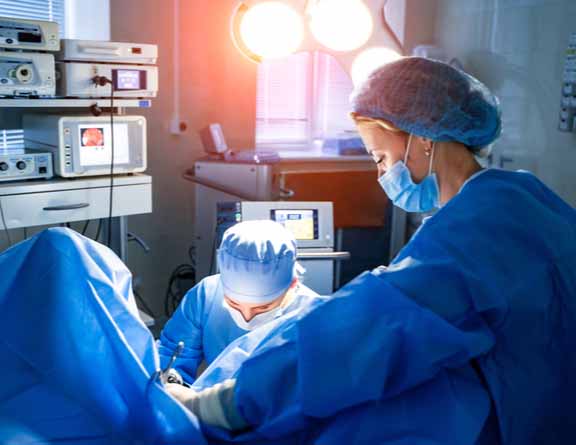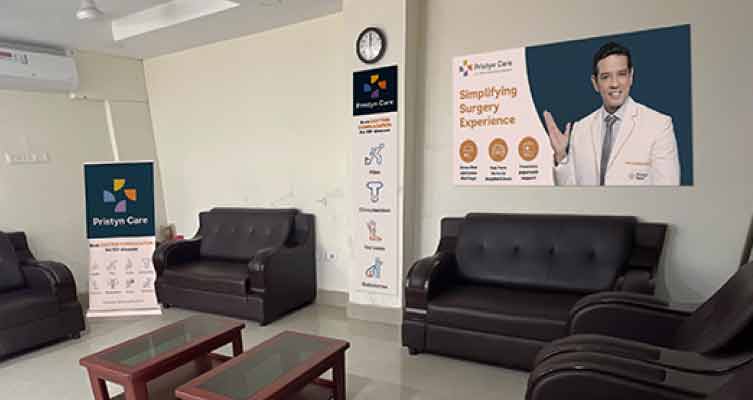
Bangalore
USFDA Approved Procedures
Minimally invasive. Minimal pain*.
Insurance Paperwork Support
1 Day Procedure


Vasectomy Procedure Step-by-Step
Preparing for vasectomy involves both physical and mental readiness. Here are some tips to help you prepare for vasectomy surgery better:
You can manage discomfort with over-the-counter pain relievers and by applying ice packs to the area.
Plan to take it easy for a couple of days after the vasectomy. Avoid strenuous activities, heavy lifting, and exercise for at least a week or as advised by your healthcare provider.
Rest and allow your body to heal and promote a faster recovery.
You may be advised to abstain from sexual activity for a week or more after the vasectomy to allow time for healing. Once you’re cleared by your healthcare provider, you can usually resume sexual activity without concerns about pregnancy.
Attend scheduled follow-up appointments to check on your progress and ensure that you’re healing properly. During this appointment, any concerns or questions you have can be addressed.
After a vasectomy, it’s essential to undergo semen analysis to confirm that there are no sperm present in your ejaculate. This typically involves providing semen samples at specified intervals after the procedure. It’s crucial to continue using alternative contraception until your healthcare provider confirms that your semen is sperm-free.
Some men may experience a range of emotions after a vasectomy, including relief, satisfaction, or even sadness. If you have concerns or emotional reactions, don’t hesitate to discuss them with your healthcare provider or a counselor.
Vasectomy is generally considered a safe and straightforward procedure, but like any surgery, it carries some risks and potential complications.
As with any surgical procedure, there is a risk of bleeding, infection, or adverse reactions to anesthesia. However, these risks are relatively low with vasectomy.
Some swelling, bruising, and discomfort in the scrotal area are common after a vasectomy. This usually resolves within a few days to a week with proper rest and care.
In some cases, a small lump called a sperm granuloma may form at the site where the vas deferens is sealed. While typically harmless, it can cause discomfort and may require medical attention if it persists or becomes painful.
Occasionally, inflammation of the epididymis (the tube that carries sperm from the testicle) can occur, leading to pain and swelling. This condition, known as congestive epididymitis, usually resolves with rest, pain medication, and anti-inflammatory treatment.
In rare instances, the vas deferens can spontaneously reconnect, allowing sperm to reappear in the semen. This can result in an unintended pregnancy. It’s essential to undergo follow-up semen analysis to confirm the absence of sperm in the ejaculate.
Some men may experience chronic testicular pain or discomfort after vasectomy, known as post-vasectomy pain syndrome. While uncommon, it can affect a small percentage of men and may require further evaluation and management.
A vasectomy is considered a permanent form of contraception, offering long-term effectiveness in preventing pregnancy by blocking the sperm’s passage from the testicles to the semen. While it provides a reliable method of birth control for those who have completed their desired family size or have chosen not to have children, does not guarantee protection against sexually transmitted infections (STIs). Despite its irreversible nature, vasectomy does not affect sexual function or desire, and many men report high levels of satisfaction with their decision. It’s important to continue practising safe sex to reduce the risk of STIs, as vasectomy only addresses fertility concerns. Regular follow-ups with healthcare providers are recommended to ensure post-procedure success and to address any concerns that may arise.
Pristyncare%20Clinic.webp)
No G42, 1st Floor, Park View Layout, Sahakara Nagar Main Rd, Byatarayanapura, Bengaluru, Karnataka 560092
Pristyncare%20Clinic.webp)
No. 76, HVV Plaza, 15th Cross, 4th Main Rd, Malleshwaram, Bengaluru, Karnataka 560055
Pristyncare%20Clinic.webp)
Chamber 1, 4M-403 2nd Floor, TRINE House, Kammanahalli Main Rd, HRBR Layout 3rd Block, HRBR Layout, Kalyan Nagar, Bengaluru, Karnataka 560043

No 33/A, 22nd Cross Rd, HSR Layout, Sector 3, Opposite HSR Club, Bengaluru, Karnataka 560102

1st Floor, Legacy Apartment, Phase 1, Neeladri Nagar, Electronic City, Above IDFC First Bank, Bengaluru, Karnataka 560100

No 449/434/09, Bellandur Doddakannelli Road, Bellandur, Behind Kanti Sweets, Bengaluru, Karnataka 560103
Delivering Seamless Surgical Experience in India
Your safety is taken care of by thermal screening, social distancing, sanitized clinics and hospital rooms, sterilized surgical equipment and mandatory PPE kits during surgery.
A dedicated Care Coordinator assists you throughout the surgery journey from insurance paperwork, to free commute from home to hospital & back and admission-discharge process at the hospital.
Our surgeons spend a lot of time with you to diagnose your condition. You are assisted in all pre-surgery medical diagnostics. We offer advanced laser and laparoscopic surgical treatment. Our procedures are USFDA approved.
We offer free follow-up consultations and instructions including dietary tips as well as exercises to every patient to ensure they have a smooth recovery to their daily routines.
Vasectomy typically involves mild discomfort or pain, but the pain level can vary from person to person. During the procedure, a local anesthetic is used to numb the area, so you should not feel any pain while the doctor makes the incision and removes or seals off the vas deferens. However, there might be mild tugging or pulling sensations during the procedure.
After the procedure, it is common to experience some soreness, swelling, and bruising in the scrotum area. This discomfort usually subsides with over-the-counter pain medication.
Yes, vasectomy is considered a permanent method of birth control. Once the vas deferens are cut off, it prevents sperm from being ejaculated during sexual intercourse, which makes pregnancy highly unlikely. While it is possible to have a vasectomy reversal surgery to reconnect the vas deferens and restore fertility, this procedure is not always successful.
If you are considering a vasectomy, you may initially consult a primary healthcare provider. The physician is likely to refer you to a general surgeon. Typically, a general surgeon is the best person to perform the procedure, can provide information about the risks and benefits and help you determine if it is the right option for you.
If you seek vasectomy in Bangalore, you may contact Pristyn Care to consult with some of the best general surgeons in Bangalore. Our urologists are highly experienced and trusted for their extensive knowledge of urology treatments and are skilled in performing different urological surgeries.
Male sterilization usually takes about 20-30 minutes to perform. The procedure can be done under local anesthesia or sedation and is usually performed on an outpatient basis, meaning the patient can go home the same day.
The biggest risk of vasectomy is the possibility of post-vasectomy pain syndrome (PVPS). PVPS is a condition that affects a small percentage of men after vasectomy, characterized by chronic or intermittent pain in the scrotum or testicles.
Other risks and complications of vasectomy include bleeding or infection at the site of the incision, swelling or bruising of the scrotum, and sperm granuloma, which is a small, hard lump that can form at the site where the vas deferens was cut or tied. However, these complications are rare, and most men recover without major issues.
Yes, vasectomy can sometimes be reversed through a surgical procedure called vasectomy reversal. During this procedure, the blocked or sealed ends of the vas deferens are reconnected to restore the flow of sperm. However, success rates vary, and not all vasectomies can be effectively reversed.
.svg)
.svg)
.svg)